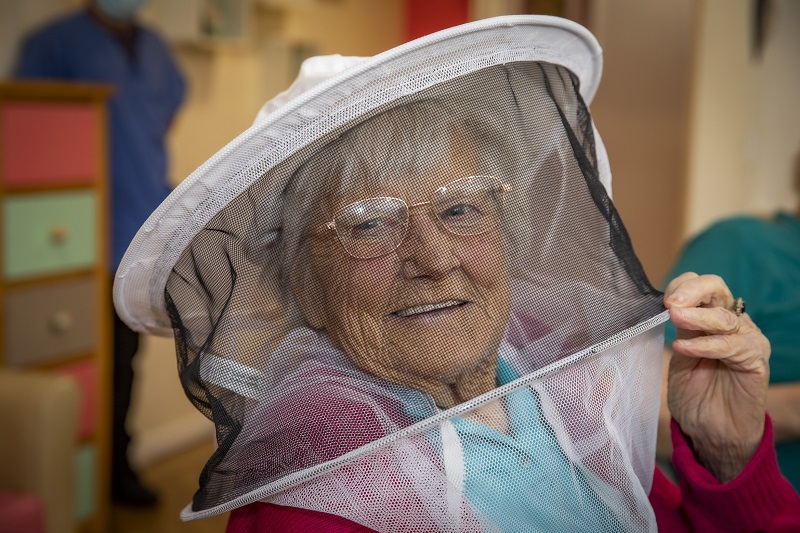
A busy bee carer has been supplying a much-welcomed sweet treat to residents at a care home.
Amateur beekeeper Louise Parry delighted residents at Pendine Park’s Hillbury House care home in Wrexham by providing them with a chance to sample the delicious honey from her hives
The dedicated care practitioner brought in some jars to share with them and delivered a fascinating talk on beekeeping.
The naturally sweet and wholesome taste left residents beaming.
Louise also brought in a honeycomb frame fresh from the hive to show how the bees produce their delectable food stores.
One resident who was overjoyed to listen to Louise’s beekeeping tales was Peter Hodder who asked lots of questions and wanted to know if Louise had any books on the subject as he is keen to read up on it.
He said: “I’m especially interested because I recall that when I was younger, my uncle was a beekeeper. It’s truly fascinating how the bees work so hard to produce such a health-giving substance.”
Also enthralled by Louise’s talk were fellow residents Gwen Davies-Barrett and Audrey Stace.
Merv Forward of the Hillbury kitchen staff said no cook should be without a jar of honey, adding that it’s ‘one of the nectars of life.’
He said: “Honey is incredibly versatile because in can be used with just about any cooking method, from grilling to roasting, and it can be used in recipes served either hot or cold.
“I must say the honey from Louise’s hives is absolutely wonderful and it adds a unique flavour buzz and delicate floral sweetness to everything.
“Honey is one of the most amazing and kindest substances on the planet because it also has anti-microbial and wound-healing properties.”
Louise has been bee keeping for about five years. It was her husband Carl Rawlinson who first became interested in starting an apiary at their home in Rhosnesni near Wrexham.
She said: “I was not at all keen when he first mentioned it but he went on a course to learn the necessary skills and when he got started I soon became more interested.
“Now I’m as fascinated as he is about how the honey bees develop and produce such a sweet sticky concoction. It is so much more delicious than any kind of shop bought honey, a different kind of product entirely to the industrial mass distributed commercial honeys.
“When I brought in the honeycomb to Hillbury people were eagerly sticking spoons in to see what it tasted like and they were completely amazed.”
She said she now regularly chats about her latest bee-keeping experiences to elderly residents and fellow staff at Hillbury, and has on a couple of occasions taken in her protective bee keeping outfit to show them, including the netted headgear which residents delighted in trying on.
She also has photographs of the bees stored on her phone, including a close up image of the magnificent queen bee surrounded by her drones.
Louise and Carl’s bees produced 100 jars of the heavenly nectar last year and the couple are hoping to reap similar success this summer.
When Pendine Park director Gill Kreft heard about Louise’s enthusiasm for bees she had a special gift delivered to her as a surprise – a ceramic honey pot complete with an ornamental bee on its lid.
Louise said: “It was such a kind thought, so nice of her and completely unexpected. It made my day.”
Louise has worked at Hillbury and its sister home Gwern Alyn for about eight years. She loves her job caring for elderly people requiring residential, nursing and dementia care, as well as those in need of respite or day care.
She said: “The residents have such great life stories to tell and we get to know their characters. It is a lovely environment here, and the home is surrounded by beautiful grounds blooming with flowers most of the year. But being a carer can be quite demanding, it’s a full on job, we’re all busy as bees ourselves, so it’s nice to have interests to go home to and de-stress.
Louise and Carl currently keep two hives, although at one stage they did have three.
Despite all their activity and being constantly on the go, an average worker bee will only produce about one twelfth of a teaspoon of honey in its lifetime. So, it takes 12 bees to make just one teaspoon of honey.
But Louise explained: “A typical hive can contain thousands of bees. It is almost impossible for us to keep an exact count. But some Queen bees can lay up to three thousand eggs in a day, producing a constant stream of the workers needed to keep the honey flowing.
“One thing that’s important is never to take all the honey from a hive because it is essentially the food source for the bees. It is honey that keeps the hive going and helps them overwinter and stay healthy.
“And for the rest of us it’s great to eat on hot buttered toast,” she laughed.